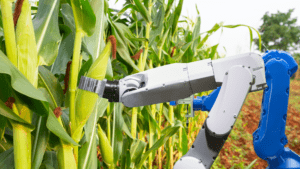The 4th agricultural revolution also referred to as Agriculture 4.0 is expected, like the fourth industrial revolution, to be characterized by changes as a result of technological advances, specifically the use of artificial intelligence (AI) to make better planning decisions and power autonomous robots.
With Robots it would be easy to weed an entire field with precision; directly drilling seed crops into the soil to plant at precisely the right depth and sowing density to ensure optimum seedling development. These can greatly increase the rate and volume of food production made sustainable by the calculated use of precision.

The use of AI has already been proven to be invaluable in the digestion of food and agricultural waste to produce nutrients which are reintegrated into the soil. Needless to say, this process is carried out with higher efficiency compared with composting. The iDigest launched by Intellidigest Ltd is a robot which tackles the problem of food waste by adapting its various functions to meet the particular food waste challenge experienced in varied locations; Industrial, commercial and residential.
Aspects of Agriculture 4.0 involve bio-engineering Innovations at a plant cellular level and the use of alternatives to soil in the farming process. A lot of these are still at a trial phase and will require close monitoring to ensure they don’t go against the ethical production of food and that their design aligns with sustainable goals geared to create a circular food system.
Another point in favour of Agriculture 4.0 is that its use of advanced machines will lead to the involvement of the younger tech-savvy generation in agriculture.

Scepticism to Agriculture 4.0 has also been registered by the National Farmers Union (NFU) as it could come with demerits considering that the 3rd agricultural revolution, otherwise known as the green revolution, which heralded the increase in the use of pesticides did see the production and use of chemicals, such as Dichlorodiphenyltrichloroethane (DDT); determined to be detrimental to the environment. Increased use of AI might mean a loss of jobs and an increase in mental health issues considering the loss of the therapeutic effects of traditional farming activities on seasoned farmers.
Small farms might encounter financial constraints in affording the equipment required to implement Agriculture 4.0. In addition to lack of finances, the scale of farming done in a region is also a hindrance to Agriculture 4.0. The precision tools required are generally structured for large-scale farming which isn’t predominant in Sub-Saharan Africa for instance. In this region also the literacy level of farmers is lower than in higher-income countries (HICs), they don’t have the Information and Communication Technology (ICT) skills required to use and monitor AI tools.
The benefits of AI to Agriculture outweigh the disadvantages however due to technical aspects involved, caution and in-depth studies by specialists are required to ensure the sustainability of the system before deployment to any facility. The success of Agriculture 4.0 will lie in the ability of the systems to maintain biodiversity and sustain environmental sustainability.
References:
- CHIVERS, C.-A. and ROSE, D., 2020. The fourth agricultural revolution is coming – but who will really benefit? [online]. The Conversation. Available from: https://theconversation.com/the-fourth-agricultural-revolution-is-coming-but-who-will-really-benefit-145810.
- JELLASON, N.P., ROBINSON, E.J.Z. and OGBAGA, C.C., 2021. Agriculture 4.0: Is Sub-Saharan Africa Ready? Applied Sciences, 11(12), p. 5750.
- Santos Valle, S. and Kienzle, J. 2020. Agriculture 4.0 – Agricultural robotics and automated equipment for sustainable crop production. Integrated Crop Management Vol. 24. Rome, FAO.

